북한 빈부격차, 특히 평양 대 비평양 지역 간 경제 문화 소비력 불평등 문제는 심각하다.좋은 분석 기사이다.
그런데 90년대 초반 이코노미스트지에 단골로 등장하던 중국의 자본주의시장 제도 도입으로 인한, 해안가 (상하이 라인)가 내륙 (inland china) 간의 빈부격차에 대한 경고 기사와 너무나 유사하다.
과거 소련연방이 해체되기 전, 사회주의 사회에서도 마르크스가 말한 '소외'가 존재하는가라는 질문들을 마구 던지던 한국 대학생 운동권들의 라디컬함이 틀린 문제의식은 아니었다. 아시아의 부상과 제 2등 시민들의 탄생은 향후 몇 세대 주제와 숙제가 될 것이다.
.
How leisure time is changing for North Korea's privileged
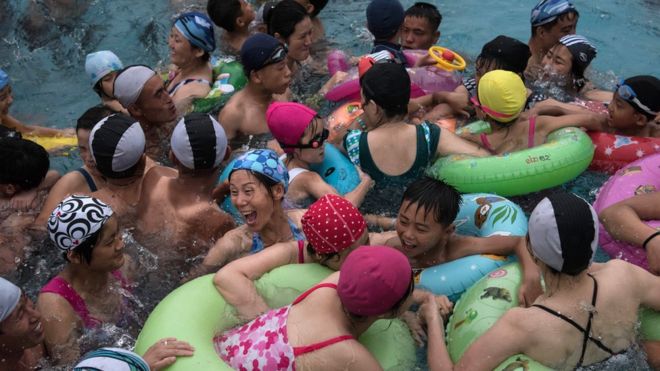 AFP
AFPWhile the majority of people in North Korea live in poverty, experts say there is a growing middle class with money to spend and free time to enjoy. From dolphin aquariums to shopping centres, this is how the country is changing to meet the demands of its most wealthy citizens.

When Jayden first used the internet he was overwhelmed by what he found.
"I had access to information that enlightened me. Every day was a surprise to me because I could get completely different perspectives that I'd never thought about. It made me outraged and sad," he says.
Jayden (not his real name) is a North Korean defector who fled to South Korea five years ago. Only a small number of people manage to escape the country, so his successful defection puts him in a privileged minority that mainly consists of young people such as him.
He recently finished an English-language course in Australia where he discovered YouTube and a host of online news sites.
These were new experiences because North Korea is one of the world's most repressive countries where basic freedoms, such as accessing foreign media, are severely restricted.
But while he was living in North Korea, Jayden frequently defied these constraints and accessed prohibited entertainment.
"I spent my spare time playing football and computer games or watching movies," he says. "Although, there were many restrictions on what could be done. Many of the movies and games were illegal but I did these things on the sly."
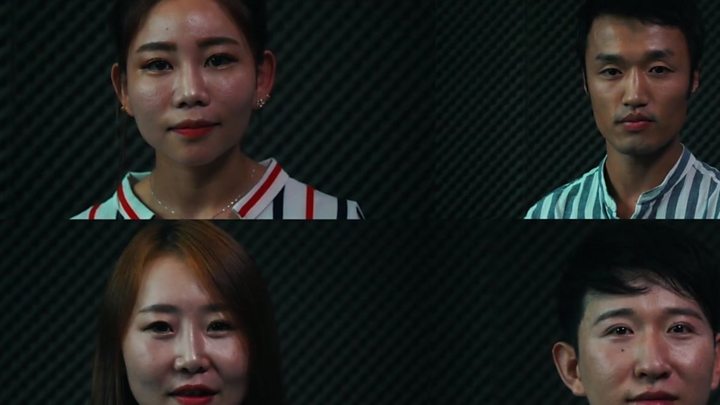
Secret fun
Unsurprisingly, there is a flourishing market for foreign entertainment in a country described as an "information black hole" by Reporters without Borders (RSF).
"The most popular pastime for North Koreans is also one of their biggest open secrets," says James Pearson, co-author of North Korea Confidential. "Most North Koreans secretly watch foreign media, particularly South Korean dramas."
"These shows offer Koreans on both sides of the border an escape from the pressures of daily life, the difference being in North Korea they're consumed in secret."
But not all forms of entertainment have to be enjoyed secretly. In fact, for North Korea's most affluent citizens, the very concept of free time is changing.
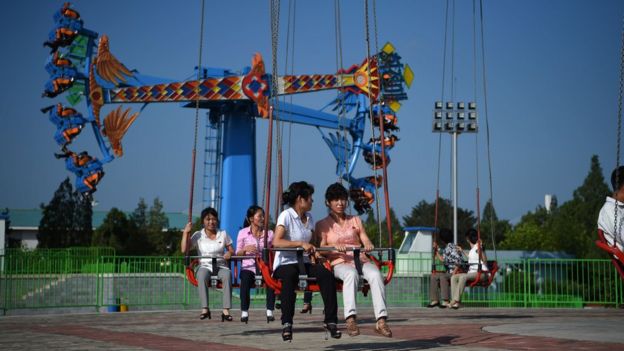 AFP
AFPVanity projects
A report by the Korea Development Institute noted a boom in the construction of shopping malls, sports, and cultural centres. It also noted that North Koreans who live in Pyongyang now have a widening range of places to spend their extra money and spare time.
There are new water parks and even a dolphin aquarium, according to Curtis Melvin, a researcher who has spent years monitoring satellite imagery of North Korea and mapping construction sites.
"Satellite imagery is perhaps the most thorough way to monitor changes, as we can keep tabs on parts of the country that are not accessible to foreigners," he says.
"This has allowed us to monitor the growth in North Korean markets, changes in transportation, infrastructure, and the proliferation of renewable energy. We can see and measure these things in a way that was not possible a decade ago."
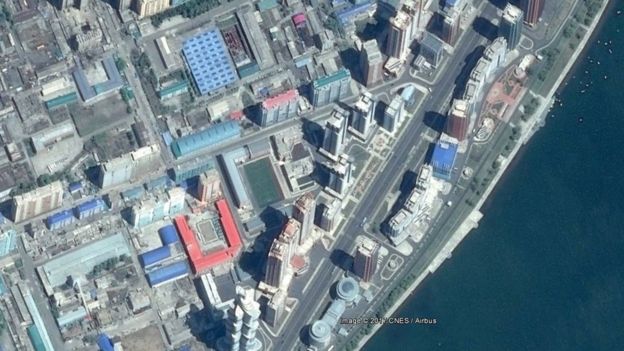 CURTIS MELVIN/GOOGLE
CURTIS MELVIN/GOOGLEThis new technology has given him a fascinating insight into how life in North Korea is changing. He has recorded an increase in amenities and buildings that are designed, on the surface at least, to bring enjoyment to the North Korean people.
"Since Kim Jong-un took over when his father died in late 2011, he has initiated construction and beautification projects that have substantially altered the character of Pyongyang," he says.
"He has focused on construction projects that purport to raise the living standards of the people - such as new housing projects, a dolphin aquarium, new shopping options, new sports facilities, new amusement parks, water parks, 3D cinemas and a ski resort. Some of these types of projects are also being rolled out in the provincial capitals and special cities as well."
- Images of North Korea's ski resort
- What's it like to live in North Korea?
- Life on the North Korean border
So why has Kim Jong-un decided to construct these leisure facilities? One suggestion is vanity.
"Part of it is to modernise Pyongyang and make it more of a 21st Century showpiece," says Andray Abrahamian, a visiting scholar at the Center for Korean Studies at the University of California, Berkeley.
"The labour is practically free, done by military conscripts, and the materials are mostly domestically sourced, so costs are pretty low," he says.
Although a booming leisure industry may seem positive, only a privileged minority are likely to benefit.
A different world
Income inequality in North Korea is rife, and the economy is mainly geared towards supporting a large military. This means the showpiece projects such as water parks, sports facilities and 3D cinemas can only be enjoyed by wealthy, usually urban-dwelling, citizens.
As Andray Abrahamian says, Pyongyang's entertainment is only available to the better off: "If you're privileged you may play squash, take yoga classes, enjoy nice restaurants - including a couple of decent Italian and Japanese spots - and sip cappuccinos at cafes. In a way, being privileged in Pyongyang is like being solidly middle-class in a wealthier country."
But this middle class, with their appetite for Pyongyang's finer elements, are a relatively new phenomenon.
"The rise of the 'donju' - literally, masters of money - has created a new, moneyed, middle class that has a healthy thirst for consumer goods and spending," says James Pearson. "This has in turn given rise to more restaurants, bars, and even coffee shops in relatively rural or provincial towns which had very little before."
So to a large extent, the rise in places where North Koreans can spend their money and enjoy themselves is down to a growing middle class. But the gulf in living standards between urban and rural areas in North Korea remains stark.
"People outside of Pyongyang live in a different world," James Pearson says.
"They work hard to make a living with little supporting infrastructure. Farmers still have rigid production quotas to meet. Many do not have access to clean drinking water or reliable electricity. They have standards of living well below people in the capital."
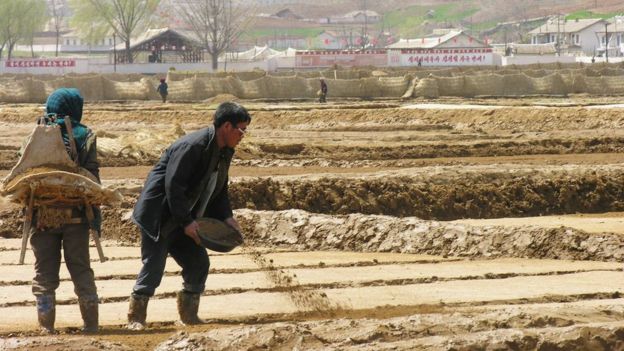 GETTY IMAGES
GETTY IMAGESAnd when Jayden thinks back to his time in North Korea he remembers this wealth divide clearly. "I think there is an immense gap," he says.
"Not many, but some people can enjoy their lives by having dinner at restaurants or visiting some places. But many people worry about their next meal. I saw various people in many social statuses and I realised the rich-poor gap was quite severe."
This means leisure time is a luxury only available to the richer residents of Pyongyang. For those living elsewhere, the introduction of amenities such as cinemas and ski resorts is likely to go unnoticed.
'한국정치 > 북한_DPRK' 카테고리의 다른 글
| 미국 여론, 민주당 지지자들이 보이는 북한에 대한 태도 (0) | 2018.04.25 |
|---|---|
| 김정은 노선, 조선노동당 중앙위 연설문 (4월 21일) 평가, 지식경제 어떻게 가능한가? (0) | 2018.04.25 |
| 김대중 조선일보 사설, 주한미군 철수마오 ~ 공포의식 버려라 (0) | 2018.04.25 |
| 북미 회담, 미국 실무자로 로버트 갈루치가 임명되는 게 좋다 (2) | 2018.03.08 |
| 북한 김정은과 트럼프는 어떤 협상을 할 것인가? bbc (0) | 2017.09.16 |
| 북핵 위기의 원인과 해법 : 미국 내 북핵을 바라보는 시각과 대응들 (0) | 2013.02.16 |
| 북핵 외교 (2008) 로버트 갈루치 인터뷰 "왜 조지 부시는 대북 정책을 강경에서 대화로 바꿀 수 밖에 없었는가?" (0) | 2012.11.22 |


